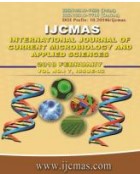


 National Academy of Agricultural Sciences (NAAS)
National Academy of Agricultural Sciences (NAAS)

|
PRINT ISSN : 2319-7692
Online ISSN : 2319-7706 Issues : 12 per year Publisher : Excellent Publishers Email : editorijcmas@gmail.com / submit@ijcmas.com Editor-in-chief: Dr.M.Prakash Index Copernicus ICV 2018: 95.39 NAAS RATING 2020: 5.38 |
Honey had been well documented as oldest traditional medicines. Its use is recorded in Egyptian papyri dated from 1900 to 1250 B.C. which used many of the Egyptian prescriptions including honey. It is also mentioned in the Holy Qu'ran. Honey enhancing the growth of tissues for wound repair, suppress inflammation, and bring about rapid autolytic debridement. The objective of this study was aimed to determine the Physiochemical analysis of some Saudi Arabia honey. The fresh 66 honey samples (3 kg of each) were kindly provided by Alnahal aljwal Company, 2016 flowering season. Honey sample was collected in a sterile universal glass container and kept at 2– 8°C until tested. Physiochemical analysis was done. Determination of sediment content, total grains, moisture content, water soluble solids, pH, acidity, electrical conductivity, colour analysis, ash content, total protein content, sugars content, inverted sugars, glucose (g/100 g), fructose (g/100 g), fructose/ glucose sucrose (g/100 g) diastase enzyme activity, HMF and microbiological examination were performed. Physiochemical analysis of honey samples were varied according to different honey sources. It was obvious that the honey quality was varied based on the botanical origins.
 |
 |
 |
 |
 |